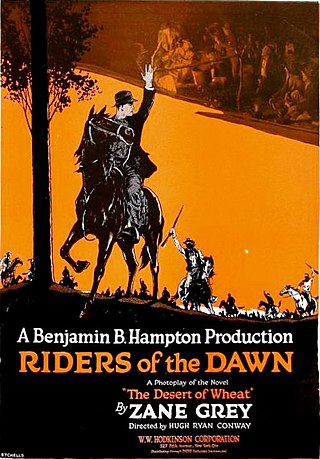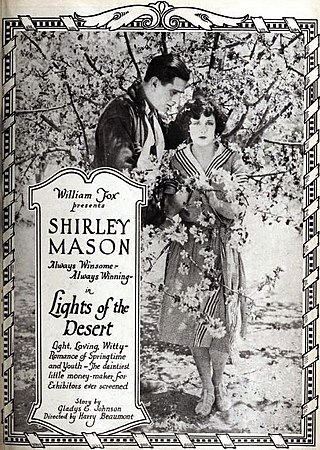Boconnoc is a civil parish in Cornwall, England, United Kingdom, approximately four miles (6 km) east of the town of Lostwithiel. According to the 2011 census the parish had a population of 96.

His Majesty, the Scarecrow of Oz is a 1914 American silent fantasy adventure film directed by J. Farrell MacDonald, and written and produced by L. Frank Baum. It stars Violet MacMillan, Frank Moore, Vivian Reed, Todd Wright, Pierre Couderc, Raymond Russell, and Fred Woodward.

Life Without Soul (1915) is a lost horror film, directed by Joseph W. Smiley and written by Jesse J. Goldburg. This film is an adaptation of Mary Shelley's 1818 Gothic novel Frankenstein; or, The Modern Prometheus. The film is about a doctor who creates a soulless man. In the end, it turns out that a young man has dreamed the events of the film after falling asleep reading Shelley's novel.
The Oz Film Manufacturing Company was an independent film studio from 1914 to 1915. It was founded by L. Frank Baum (president), Louis F. Gottschalk, Harry Marston Haldeman (secretary), and Clarence R. Rundel (treasurer) as an offshoot of Haldeman's social group, The Uplifters, that met at the Los Angeles Athletic Club. Its goal was to produce quality family-oriented entertainment in a time when children were primarily seeing violent Westerns. It was a critical but not a commercial success; even under a name change to Dramatic Feature Films, it was quickly forced to fold. The studio made only five features and five short films, of which four features and no shorts survive. Founded in 1914, it was absorbed by Metro Pictures, which evolved into Metro-Goldwyn-Mayer.

Vivian Reed, also known as Vivian R. Green, was an American silent film actress. She appeared in 36 films between 1914 and 1938, and was described in news reports during her early years as "the girl-with-the-million-dollar-smile" and a "screen beauty" who was "one of the most beautiful young women in motion pictures."

The Undying Flame is a lost 1917 silent film drama directed by Maurice Tourneur, produced by Jesse Lasky and released by Paramount Pictures. This movie starred Olga Petrova, an English-born actress who became popular in silents playing vamps.

Girls is a 1919 American silent romantic comedy directed by Walter Edwards and starring Marguerite Clark. It is based on the 1909 Broadway play of the same name by Clyde Fitch starring Florence Reed in the part Clark plays in this film.

Pilton House in the parish of Pilton, near Barnstaple, North Devon, Ex31, is an historic grade II listed Georgian mansion house built in 1746 by Robert Incledon (1676-1758), twice Mayor of Barnstaple, who was from nearby Braunton. It is situated almost in the centre of the ancient town of Pilton, but had formerly extensive grounds covering at least 20 acres, which extended down "Pilton Lawn", now built over, to the River Yeo. It later served as the residence for various Members of Parliament for Barnstaple, for which it was well suited being only a 10-minute walk from the centre of that town, yet in a secluded situation with extensive grounds, and sufficiently large and grand for entertaining borough officials and electors.

Soldon in the parish of Holsworthy Hamlets, Devon, England, is a historic estate, a seat of the Prideaux family. The manor house is a grade II listed building dating from the mid-16th century with later alterations. It was sold in 2014 as an eight bedroomed house with an acre and a half of grounds for an asking price of £750,000.
Public Opinion is a 1935 American drama film directed by Frank R. Strayer and starring Lois Wilson, Crane Wilbur and Shirley Grey.

The Midnight Man is a 1917 American crime drama silent black and white film directed by Elmer Clifton and written by Tom Gibson. It is based on the story of Bess Meredyth.
The Mainspring is a 1916 American silent drama film directed by Jack Conway and starring Ben F. Wilson, Wilbur Higby and Francelia Billington.

Riders of the Dawn is a 1920 American silent Western film directed by Jack Conway and starring Roy Stewart, Claire Adams, and Joseph J. Dowling.
Refuge is a 1923 American silent drama film directed by Victor Schertzinger and starring Katherine MacDonald, Hugh Thompson and J. Gunnis Davis.

Seeing's Believing is a 1922 American silent comedy film directed by Harry Beaumont and starring Viola Dana, Allan Forrest, and Gertrude Astor.

Princess Virtue is a 1917 American silent drama film directed by Robert Z. Leonard and starring Mae Murray, Lule Warrenton and Wheeler Oakman. An incomplete copy was found and kept in the Library of Congress. Prints and/or fragments were found in the Dawson Film Find in 1978.

A Royal Family is a 1915 American silent drama film directed by William Nigh and starring Fuller Mellish, Montagu Love and Anna Murdock. It is also sometimes alternatively titled The Royal Family.

Lights of the Desert is a 1922 American silent Western film directed by Harry Beaumont and starring Shirley Mason, Allan Forrest and Edmund Burns.

The Ragged Heiress is a 1922 American silent drama film directed by Harry Beaumont and starring Shirley Mason, John Harron and Edwin Stevens.

Thorns and Orange Blossoms is a 1922 American silent drama film directed by Louis J. Gasnier and starring Estelle Taylor, Kenneth Harlan, and Edith Roberts.















